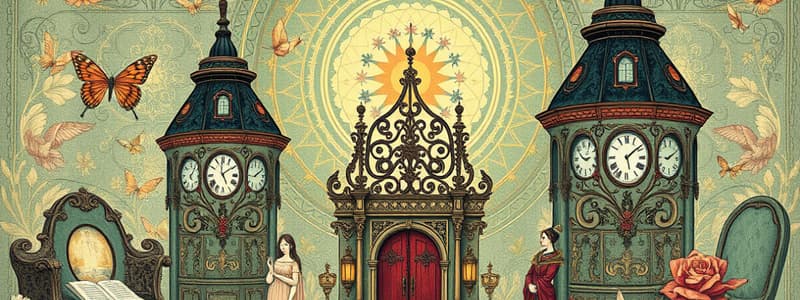Podcast
Questions and Answers
What are the interests of Pramod K. Nayar?
What are the interests of Pramod K. Nayar?
- Cultural studies (correct)
- Psychology and psychoanalysis
- Modern art
- English colonial writing on India (correct)
What does prefacing theory aim to accomplish?
What does prefacing theory aim to accomplish?
It is a statement of intention and an introduction to what the book does.
Theory is restricted to literary texts.
Theory is restricted to literary texts.
False (B)
The most sophisticated approaches to literary texts have come from __________.
The most sophisticated approaches to literary texts have come from __________.
What does contemporary literary and cultural theory seek to understand?
What does contemporary literary and cultural theory seek to understand?
Flashcards are hidden until you start studying
Study Notes
Overview of Contemporary Literary and Cultural Theory
- Explores the evolution from Structuralism to Ecocriticism, highlighting a range of critical theories.
- Major areas of theorization include Structuralism, Poststructuralism, Psychoanalytic Criticism, Feminisms, Marxisms, Postcolonial Theory, Queer Theory, New Historicism, Critical Race Studies, and Ecocriticism.
About the Author: Pramod K. Nayar
- Teaches at the University of Hyderabad, India.
- Fulbright Senior Fellow at Cornell University and has held fellowships at prestigious UK institutions.
- Focuses on English colonial writing, literary theory, postcolonial literature, and cultural studies.
- Notable works include "English Writing and India, 1600–1920" and "Virtual Worlds: Culture and Politics in the Age of Cybertechnology".
Prefacing Theory
- Theory is often criticized for its jargon and complexity, leading to misunderstandings.
- Critics may resist Theory due to its destabilizing effect on established interpretations and authority in literary studies.
- A preface signals the author's intent and prepares readers for the text's forthcoming ideas and themes.
- Literary Theory involves a systematic analysis of texts, while Cultural Theory extends this analysis to various cultural practices beyond literature.
Contemporary Theory's Focus
- Questions around modes of interpretation, distribution of knowledge, and the educative roles of literary texts.
- Investigates the historical contexts of texts and their implications on individual and collective psychology.
- Emphasizes the political consequences arising from diverse forms of representation.
The Complexity of Theory
- Influenced by various non-literary fields such as anthropology and psychoanalysis since the mid-1960s.
- Engages with issues of meaning-making, representation practices, and consumption in cultural products.
- Explores the interaction between social structures and meanings in literature and film, along with abstract concepts like power dynamics.
Conclusion
- Contemporary literary and cultural theory provides tools for critical analysis, fostering a richer understanding of texts and their broader implications in society and culture.
Studying That Suits You
Use AI to generate personalized quizzes and flashcards to suit your learning preferences.



